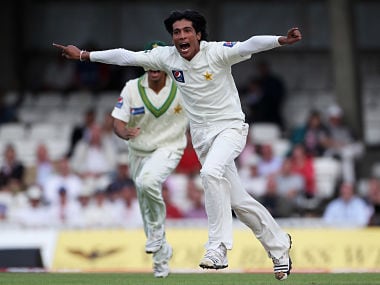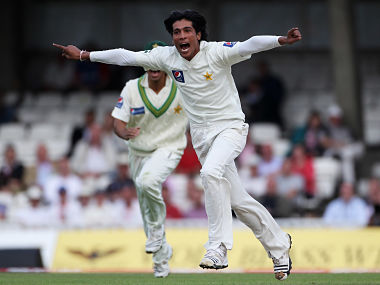Editor’s note: This article was published on 11 December, when Mohammad Amir’s return to the Pakistan squad was impending. He has since reported for Pakistan’s traning camp after being cleared by the PCB, but the inevitable backlash is happening. Pakistan ODI captain Azhar Ali and senior member of the team Mohammad Hafeez both reportedly walked out of training on Thursday, expressing their disapproval at Amir’s return. So, from the archives, a case for why Amir should not have anything to do with cricket anymore. Cricket is soon to face its most decisive event since the takeover of the ICC by the so called “Big three”. Pakistan Cricket Board chairman Shaharyar Khan this week strongly suggested that Mohammad Amir may soon be playing international cricket again. “Yes, we are looking at a him for this series (vs New Zealand in January) and he could return to the national side on the tour.” This is the same Mohammad Amir who was convicted in a UK court of spot fixing, and for his crimes spent time in Portland Young Offenders Institute in Dorset. A real life cheat. A real life criminal. A man who disgraced cricket and his country. Yet some in Pakistan want him back. The relatively binary view of his supporters is that he has paid the price and must be allowed to continue on with life. With life? Yes, there can be no argument. But with cricket? [caption id=“attachment_2070011” align=“alignleft” width=“380”] Pakistani pacer Mohammad Amir. Getty Images[/caption] The crumbling and sadly obvious facade in this debate is that if Amir was not very good, the bandwagon would not currently be hitched. Where are the cries from these Amirites arguing for Salman Butt or Mohammad Asif’s return? The fact that Amir is a wildly talented bowler is not in dispute. But why should one’s relative skill in a vocation override the broader issues about cheats in cricket? Society demands that any criminal be allowed to continue with certain rights after their initial punishments have expired. However, residual punishments linger to protect the wider group. For example, school teachers require a Working With Children permit in Australia. Someone looks into your past to see if you are a suitable candidate to be around kids. In many parts of the USA, convicted persons are ineligible to vote. Worldwide, state police checks are mandatory in a multitude of occupations. Society is therefore saying that a convicted criminal may continue to play amongst us, but they have forfeitesportd the right to participate in some areas. The binary argument that Amir has served his time and is therefore afforded the right to return to cricket is lacking any flavour of how the real world works. Cricket is a game. For some, it is a way to make a living. However, it owes nothing to anybody. We are privileged to be able to interact with it, but it is us who must care for it. To argue the exclusion of cheats from cricket is to argue that you only get one chance to criminally disrespect it. Abuse that chance, and cricket demands that you continue living your life elsewhere. Cricket doesn’t need you, no matter how big a name or skillful at swinging the ball you may be. Perhaps you could try being a chef, real estate agent, charity worker or road builder. Parallel, in Amir’s case, we hear the trodden, worn out line of reasoning that he was “young”. He committed his crimes while only 17 years old. Yet, the justice system still found him guilty and locked him up, thereby making the statement that he was mature enough to know right from wrong. For those that argue that at 17 he wasn’t culpable in his actions, I ask you to tell me at what age should he be held clever enough to know that taking money to cheat is illegal? Is 18 old enough? 19? 20? 21?……where would you like me to stop? Consistency is the key. A person properly convicted in a court of law should be banned from cricket for life. Amir should not be welcomed back. That Wasim Akram this week also supported the young quick is no great endorsement. We quickly forget that the Qayyum Commission into Corruption in Pakistani Cricket named him as a person not beyond reproach. In fact, the judge this year conceded he would have been harder in his report on Akram if he wasn’t such a big fan of his. And here lies the problem. Fandom has created a set of blinkers over our eyes that move us from considered guardians of cricket to teenage Justin Bieber fans. Happy to set aside our principles if the subject matter has enough rock star qualities. Mohammed Hafeez has not let go of the important issue. He has publicly stated he will refuse to play in any team that Amir is selected in. Mohammad Amir took a proverbial dump on cricket’s teat from which we all suckle. We welcome him back into society, but let him find some other profession in which to restart his life. To allow him back into the fold is a mistake. Cricket owes him nothing.
Pakistani pacer Mohammad Amir. Getty Images[/caption] The crumbling and sadly obvious facade in this debate is that if Amir was not very good, the bandwagon would not currently be hitched. Where are the cries from these Amirites arguing for Salman Butt or Mohammad Asif’s return? The fact that Amir is a wildly talented bowler is not in dispute. But why should one’s relative skill in a vocation override the broader issues about cheats in cricket? Society demands that any criminal be allowed to continue with certain rights after their initial punishments have expired. However, residual punishments linger to protect the wider group. For example, school teachers require a Working With Children permit in Australia. Someone looks into your past to see if you are a suitable candidate to be around kids. In many parts of the USA, convicted persons are ineligible to vote. Worldwide, state police checks are mandatory in a multitude of occupations. Society is therefore saying that a convicted criminal may continue to play amongst us, but they have forfeitesportd the right to participate in some areas. The binary argument that Amir has served his time and is therefore afforded the right to return to cricket is lacking any flavour of how the real world works. Cricket is a game. For some, it is a way to make a living. However, it owes nothing to anybody. We are privileged to be able to interact with it, but it is us who must care for it. To argue the exclusion of cheats from cricket is to argue that you only get one chance to criminally disrespect it. Abuse that chance, and cricket demands that you continue living your life elsewhere. Cricket doesn’t need you, no matter how big a name or skillful at swinging the ball you may be. Perhaps you could try being a chef, real estate agent, charity worker or road builder. Parallel, in Amir’s case, we hear the trodden, worn out line of reasoning that he was “young”. He committed his crimes while only 17 years old. Yet, the justice system still found him guilty and locked him up, thereby making the statement that he was mature enough to know right from wrong. For those that argue that at 17 he wasn’t culpable in his actions, I ask you to tell me at what age should he be held clever enough to know that taking money to cheat is illegal? Is 18 old enough? 19? 20? 21?……where would you like me to stop? Consistency is the key. A person properly convicted in a court of law should be banned from cricket for life. Amir should not be welcomed back. That Wasim Akram this week also supported the young quick is no great endorsement. We quickly forget that the Qayyum Commission into Corruption in Pakistani Cricket named him as a person not beyond reproach. In fact, the judge this year conceded he would have been harder in his report on Akram if he wasn’t such a big fan of his. And here lies the problem. Fandom has created a set of blinkers over our eyes that move us from considered guardians of cricket to teenage Justin Bieber fans. Happy to set aside our principles if the subject matter has enough rock star qualities. Mohammed Hafeez has not let go of the important issue. He has publicly stated he will refuse to play in any team that Amir is selected in. Mohammad Amir took a proverbial dump on cricket’s teat from which we all suckle. We welcome him back into society, but let him find some other profession in which to restart his life. To allow him back into the fold is a mistake. Cricket owes him nothing.
Slightly cheeky Australian based cricket writer, podcaster and match caller. Described by Martin Crowe as vorpal. That's good right?
)